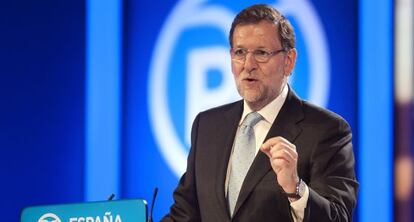PM steers clear of post-election pacts talk: “All the parties are tied at zero”
Ciudadanos chief Albert Rivera rules out deal with Rajoy’s Popular Party

Spanish Prime Minister and Popular Party (PP) leader Mariano Rajoy does not want to speculate about any possible pact or offer he might make to Ciudadanos after Sunday’s general election, in which polls show his party is likely to lose its absolute majority in Congress.
Just a few hours after the PM had, during an informal chat with journalists, advocated a “stable pact” and “government agreement” that would transmit confidence over the next legislature with journalists, he told Cadena SER radio network on Wednesday that “all the parties are tied at zero” until the election, and avoided talk of any possible deal with Albert Rivera’s emerging party.
Spaniards need a new government. Neither Rajoy nor Sánchez represent that change” Ciudadanos leader Albert Rivera
Ciudadanos is the only political force expected to garner the results on December 20 with which the PP would consider a post-election deal.
For his part, Rivera said on Wednesday that he was against signing any deal with either the PP or the Socialists, the two parties that have dominated Spanish politics for the last three decades. “Spaniards need a new government,” he said. “Neither Rajoy nor [Socialist leader] Pedro Sánchez represent that change.”
The latest opinion poll carried out by Metroscopia shows the PP winning 25.3% of the vote and between 105 and 112 deputies in the 350-seat Congress, meaning it will have to reach a deal with another party if it is to continue in power. The Socialists are predicted to place second, earning 21% of the vote and between 85 and 94 deputies, with Podemos third (19.1%, 55 to 64 seats) and Ciudadanos fourth (18.2%, 53 to 67 seats).
In the SER interview Rajoy repeated that he preferred stability and delegated that responsibility to whichever political force is victorious at the polls, thus ratifying his promise that the PP would not seek to govern if it did not receive the most votes.
At this level, I can accept being interrupted in a debate, but not being insulted and having my honor questioned” Popular Party leader Mariano Rajoy
Neither did he wish to speculate about whether his continuance as prime minister might condition any future pact. “I have to operate based on the facts that emerge, not on hypothesis,” he said.
“Ask me on the 21st if I am going to continue,” he later added.
Rajoy also commented on Monday’s intense head-to-head TV debate with Pedro Sánchez, in which the Socialist Party leader went as far as tell him that he was “not a decent person,” prompting Rajoy to call his opponent “contemptible, petty and mean-spirited.”
“At this level, I can accept being interrupted in a debate and statistics being made up, but not being insulted and having my honor questioned,” Rajoy told SER.
In the debates with Sánchez’s predecessors, José Luis Rodríguez Zapatero and Alfredo Pérez Rubalcaba, he said “there was respect between people. What I saw the other day I have never seen in my political life.”
Rajoy also dodged talk about corruption, including the latest case to affect his party involving commissions allegedly paid to the former Spanish Ambassador to India, Gustavo de Aristegui, and PP deputy Pedro Gómez de la Serna in exchange for helping Spanish companies in Algeria.
Aristegui has already resigned his ambassadorship over the case and Rajoy declined to comment on whether he thought Gómez de la Serna should also step down, as some PP officials, including his deputy Soraya Sáenz de Santamaría, have demanded. “Everything the deputy prime minister says is well said,” he noted.
After rejecting the need to regulate Spain’s euthanasia laws and admitting that the party had experienced problems in reforming the abortion law, Rajoy also remained ambiguous about how the country might contribute to the fight against international Islamist terrorism in the wake of the Paris attacks.
Relations between France and Spain were “magnificent,” he said. “If France needs Spain’s support, it will have it.”
English version by Nick Funnell.
Tu suscripción se está usando en otro dispositivo
¿Quieres añadir otro usuario a tu suscripción?
Si continúas leyendo en este dispositivo, no se podrá leer en el otro.
FlechaTu suscripción se está usando en otro dispositivo y solo puedes acceder a EL PAÍS desde un dispositivo a la vez.
Si quieres compartir tu cuenta, cambia tu suscripción a la modalidad Premium, así podrás añadir otro usuario. Cada uno accederá con su propia cuenta de email, lo que os permitirá personalizar vuestra experiencia en EL PAÍS.
¿Tienes una suscripción de empresa? Accede aquí para contratar más cuentas.
En el caso de no saber quién está usando tu cuenta, te recomendamos cambiar tu contraseña aquí.
Si decides continuar compartiendo tu cuenta, este mensaje se mostrará en tu dispositivo y en el de la otra persona que está usando tu cuenta de forma indefinida, afectando a tu experiencia de lectura. Puedes consultar aquí los términos y condiciones de la suscripción digital.








































